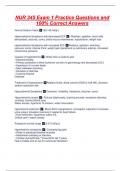NUR 345 Exam 1 Practice Questions and
100% Correct Answers
Normal Sodium Value ✅136-145 mEq/L
Hypernatremia Symptoms with decreased ECF ✅• Restless, agitation, brain cells
dehydrated, seizures, coma, sticky mucus membranes, hypotension, weight loss
Hypernatremia Symptoms with increased ECF ✅Restless, agitation, twitching,
seizures, coma, intense thirst, weight gain (peripheral or pulmonary edema), increased
intravenous pressure
Causes of hyperatremia ✅• Water loss or sodium gain
• Hyperosmolality
• Primary protection is thirst (common concern in gerontology and decreased LOC)
• Hypertonic IV or tube feeds
• Near saltwater drowning
• Diuretics or diarrhea
• Cushing disease
Diabetes
Treatment of hyperaremia ✅Replace fluids, dilute volume (D5W or half NS), diuretics,
sodium restriction diet
Hyponatremia Symptoms ✅Confusion, irritability, headache, seizures, coma
Hyponatremia causes ✅• Profuse diaphoresis, draining wounds, excessive diarrhea,
vomiting, trauma (blood loss)
Water excess, hypotonic IV solution, water intoxication
Hypoatremia treatment ✅• Block ADH (vasopressin), conivaptan (vaprisol) to increase
urine output, tolvaptan (samsca) if related to heart failure
• Fluid restriction, hypertonic saline 3%
Critical care—watch closely
Potassium normal range ✅(3.5-5 mEq/L)
Hyperkalemia symptoms ✅• Cramping leg pain
• Weak or paralyzed skeletal muscles
• Abdominal cramping or diarrhea
• Cardiac dysrhythmias **know EKG: tall T-wave
Heart irritable and at risk for ventricular fibrillation
, Hyperkalemia causes ✅• Renal failure (90% of potassium excreted through urine)
• Shift from ICF to ECF (digoxin or beta blocker prevent potassium from entering cells)
Massive intake—renal insufficiency or only one kidney
Hyperkalemia treatment ✅• Eliminate oral and parenteral K intake
• Bind potassium to sodium > passed through stool
• Increase elimination of K (diuretics)
• Force K from ECF to ICF
• IV insulin
Monitor vitals and heart rhythm
Hypokalemia symptoms ✅• Cardiac most severe (shadow T wave)
• Skeletal muscle weakness, especially in legs
• Weakness of respiratory muscles
• Decreased GI motility
• Impaired regulation of arteriolar blood flow
Hyperglycemia (impaired insulin secretion)
Hypokalemia causes ✅• Increased loss K through diarrhea, diuresis, insulin
• Increased shift of K from ECF to ICF
• Dietary K deficiency (rare)
• Magnesium deficiency
Metabolic alkalosis
Hypokalemia treatment ✅• Always dilute IV KCl
• NEVER give KCl via IV push or as a bolus
• Should not exceed 10 mEq/hr
• Can burn or blow IV—run slow, give ice pack for pain
• Check BMP—know current
• Monitor urine output
• Decreased potassium enhances digoxin absorption > increased risk for toxicity
Potassium sources ✅fruits and veggies (bananas, oranges, broccoli, avocados,
melons), lean meats, whole grains
calcium normal levels ✅(9.0-10.5 mg/dL)
Hypercalcemia symptoms ✅Lethargy, weakness, depressed reflexes, decreased
memory, confusion, anorexia, bone pain, fractures, kidney stones
Hypercalcemia causes ✅•Hyperparathyroidism
• Malignancy
Prolonged immobilization, bone mineral loss




